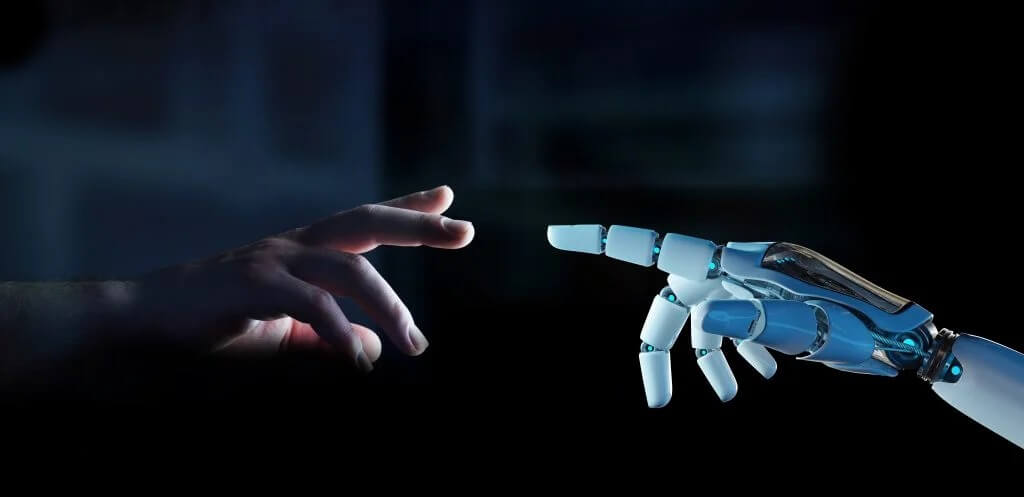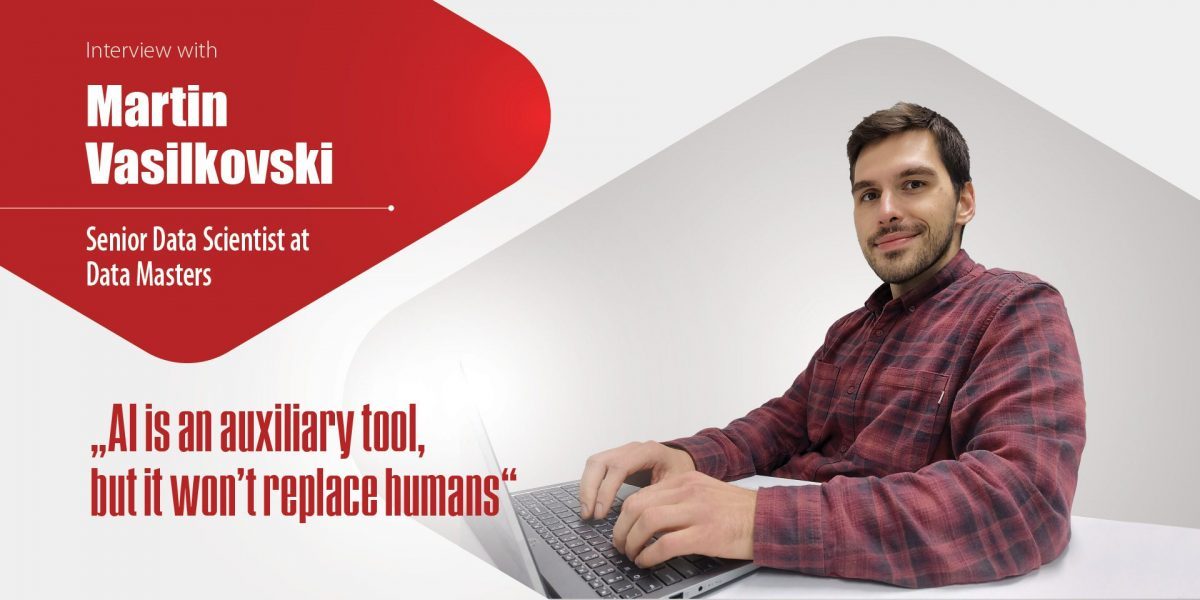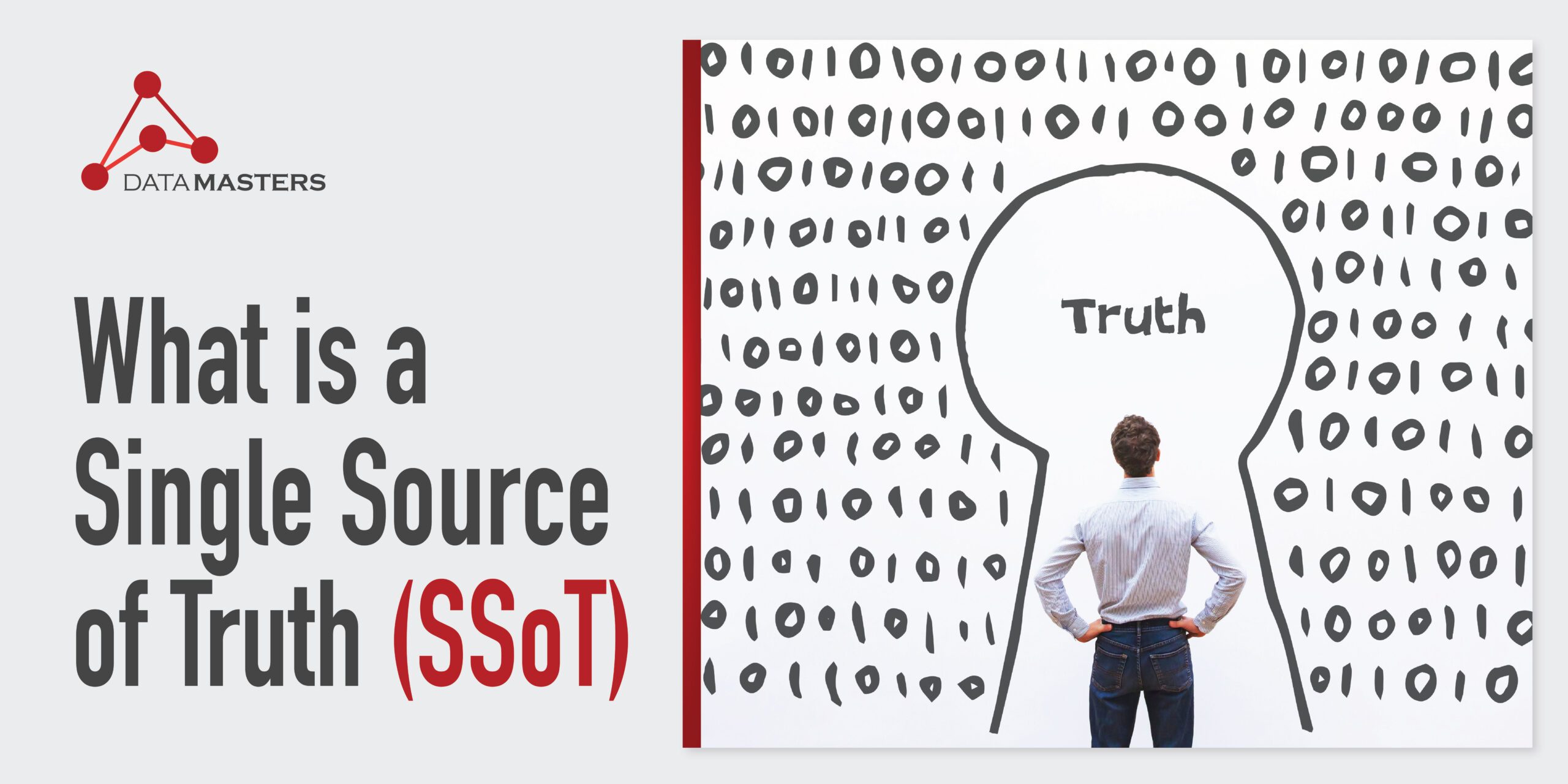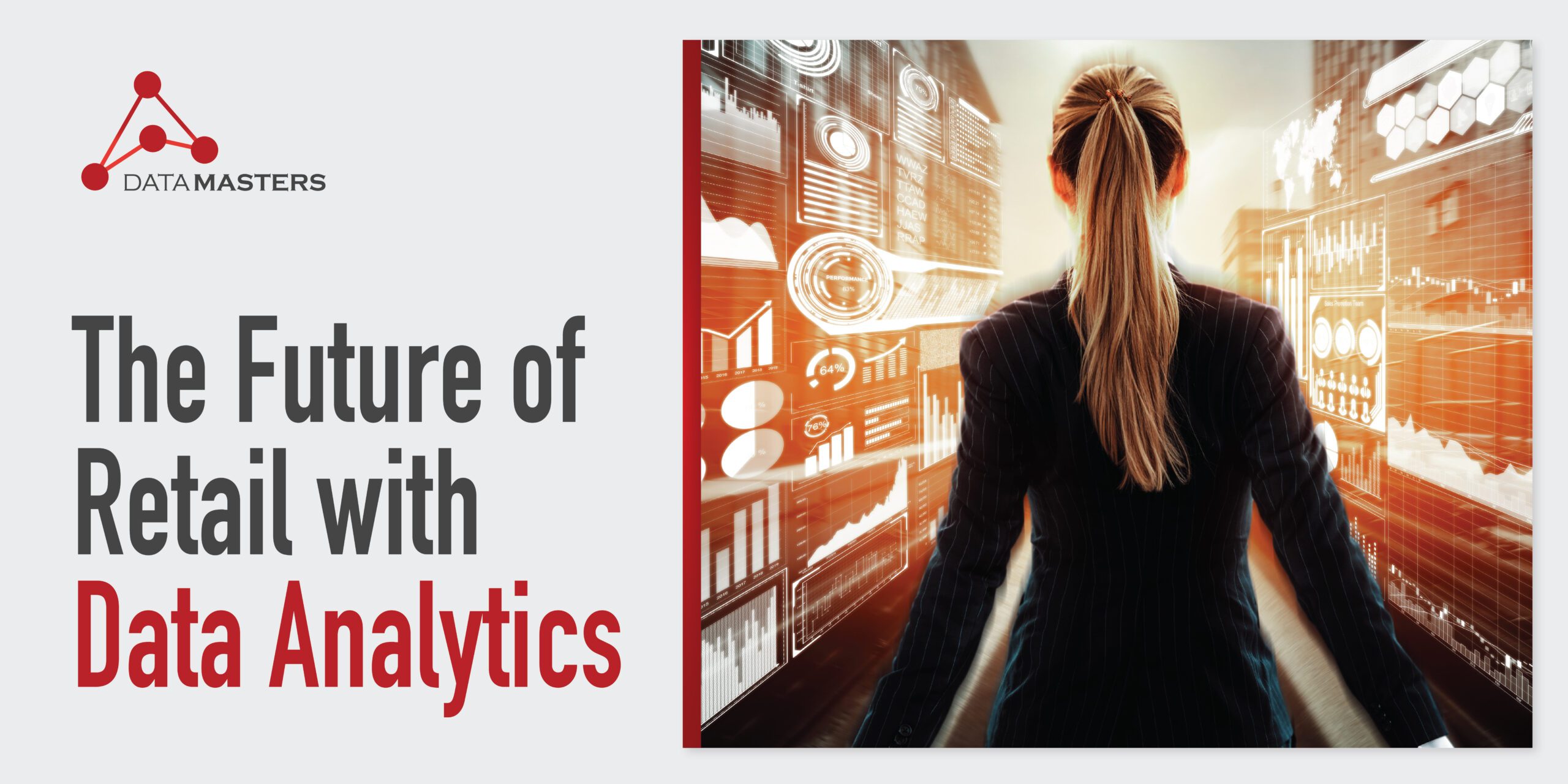The fast-paced advancement of technology has completely changed our daily living, how everyday tasks are completed and business is managed. Part of this change is due to the implementation of artificial intelligence, more precisely machine learning, which is contributing to making our everyday living much easier (very often without us even realizing it) and is taking a large swing in different fields.
From process automation to easy road navigation while traveling and having personal assistants, we are in fact talking about a large number of fields where AI is being implemented, hence our conversation with Martin Vasilkovski, a Senior Data Scientist at Data Masters.
IF WE MAKE A SHORT HISTORICAL OBSERVATION, WHEN CAN WE SAY THE BEGINNINGS OF AI ARE, AND WHAT WAS THE MOTIVE BEHIND ITS ADVENT?
Artificial intelligence is a concept defined as intelligence demonstrated by machines versus intelligence demonstrated by people and other living creatures. We are talking about creating computer programs that can take various information from everything that happens around them and use them to make rational decisions. The first mention of the expression Artificial Intelligence occurred in the 40s of the 20th century. Although soon after that the field had a major standstill and unsuccessful attempts for visible progress, in the 80s it took a big swing forward thanks to the commercial success of expert systems.
The release of a large number of sci-fi books, comics, and movies is maybe the best example of people’s interest in this field, and their attempt to predict how far AI can go in the future. Even if you have very little interest in art, you are certainly familiar with titles such as „Blade Runner“; „2001: A Space Odyssey“; „I, Robot“; „Minority Report“; „A.I. Artificial Intelligence“.
IN WHAT WAY DO MACHINE LEARNING AND ITS APPLICATIONS CONTRIBUTE TO THIS?
While AI is considered a concept, Machine learning is a field that studies computer algorithms capable of automatic enhancement through data analysis and its application.
Many times, the Artificial Neuron Networks are identified with machine learning, but the reality is that they are only a small portion of the whole set of algorithms capable to improve upon themselves through data „experiences“.
The most important part here is that the machine learning algorithms are learning from what we show them, and we are giving them examples of what they should do in certain situations (an example being: if a car is moving/driving straight and there is an object in front of it, it should stop). By learning from hundreds and thousands of examples, they can find all kinds of patterns and are capable to decide further in situations that aren’t identical to the ones given to them in the learning phase.
A VERY BASIC, AND YET ESSENTIAL QUESTION – WHY DO WE NEED ARTIFICIAL INTELLIGENCE?
Artificial intelligence shouldn’t be seen as something that will replace humans. On the contrary, it should be perceived as an auxiliary tool that helps us perform all types of tasks much more simpler, more efficiently, and better. Without even realizing it, we are using lots of devices and software that „magically“ have become better through the years, but in fact, they’ve been using a series of machine learning algorithms.

THE FAST-PACED TECHNOLOGICAL ADVANCEMENT IS A VERY COMMON TOPIC, THAT IN PRACTICE CAN BE SEEN BY HOW IT FACILITATES OUR FUNCTIONING. IF WE MAKE A QUICK OBSERVATION, WHAT IN THE PAST TWO DECADES HAS BEEN REVOLUTIONIZED AND REDUCED TO A SIMPLE TASK THANKS TO THE APPLICATION OF AI?
This is a very broad question because, in every sphere of society, you can find a thousand ways in which AI is used and facilitates everyday living. If you are using Excel, then a good example of it would be the automatic management of data in the columns. For a person that loves to play video games, an example would be the animated opponents that compared with the ones from 30 years ago look like they are controlled by real players, not by a computer. Cars nowadays have a set of computer elements, part of which have artificial intelligence algorithms for active monitoring of the road lane, detection of pedestrians, cyclists, etc.
There are many examples that suggest that AI is being actively used in many fields and is a normal part of how we function.
CAN YOU POINT OUT THE BEST EXAMPLES OF EVERYDAY IMPLEMENTATION OF AI OF WHICH WE ARE SO USED TO THAT WE DON’T EVEN NOTICE IT ANYMORE?
I always say that one of the best discoveries in the last 10 years is Shazam – an application that can detect a song and reveal the song’s title as well as all other information about it. Other great everyday examples are camera filters (Instagram, Snapchat), map apps (Google Maps, HereWeGo, Sygic), face recognition (face lock), spam filters (every e-mail provider has these types of algorithms), and also we can mention the popular recommendation systems such as Netflix and Spotify.
STARTING FROM THE POTENTIAL THAT SELF-DRIVING CARS HAVE, USING PERSONAL ASSISTANTS SUCH AS SIRI AND ALEXA, ROAD TRAFFIC CHECKS, AND HAVING CONVERSATIONS WITH CHATBOTS, SOME THINGS HAVE THEIR PLACE IN OUR EVERYDAY LIFE AND FROM THIS PERSPECTIVE, IT’S HARD TO IMAGINE GOING BACK. FROM YOUR PERSPECTIVE, WHAT IS THE BIGGEST AI IMPLEMENTATION CONTRIBUTION IN THE PRESENT?
As I have mentioned previously from a couple of examples we use in our daily life, very rarely can someone imagine their day without using Google Maps. Also, living in a world without spam filters – would otherwise end with your email being filled with unnecessary advertisements.
IF THIS IS HOW THE PRESENT LOOKS LIKE, IN WHAT DOMAINS AI HAS THE BIGGEST POTENTIAL TO IMPROVE OUR LIVES IN THE FUTURE?
First of all, it would be medicine. It is something that I am personally interested in because I have always admired robotics and AI in medicine, also I had the honor to write my Master’s thesis on the surgery robot Da Vinci. It can be implemented to help with diagnostics, assist internists to choose the right medicine for a particular diagnosis, and also assist surgeons in complex and long surgeries.
In near future, if hardly ever, robots won’t replace doctors and specialists, that’s a fact that is overlooked because we are carried away by what we see in sci-fi movies.
Additionally, I would like to mention the automotive industry with self-driving vehicles, but almost every one of us is aware of what Tesla is doing.
ARE YOU UNDER THE IMPRESSION THAT AI IS A SUBJECT OF UNREASONABLE PREJUDICE – STARTING FROM THE PRESUMPTION THAT ROBOTS ARE GOING TO WIPE OUT JOBS AND DEHUMANIZE SOCIETY? WHAT ARE THE DANGERS OF UNREASONABLE USAGE OF AI?
First of all, AI learns from examples that we give to it. If we would like to say that an AI model works with a certain bias, then we have to see what we have presented for the model to learn and if we have been the ones with bias when we’ve set the examples. I am saying this because we are the ones that are in control. There can be negative consequences if someone designs something dangerous and has no intention of putting a restriction on it. It’s like designing a car without breaks. Such a car has the potential to be a useful vehicle, but if a pedestrian came out in front of the car it wouldn’t be able to stop.
If we think that AI purposely by itself aims to the detriment of people, that’s not real, because the control is always in our hands. The question is: does the person that created it has bad intentions?
About the part of taking over existing jobs, of course, technological advancement implies replacing labor with a machine. This has been the case since the Industrial Revolution to this day. AI, like other machines for facilitating tasks, for sure has a percentage of these replacements to its name, but that in no way means that it will replace humans. On the contrary, in most cases, it will be implemented as a helping tool.
LET’S MAKE A PREDICTION – WHAT DO YOU EXPECT TO CHANGE IN THE FORESEEABLE FUTURE IN OUR EVERYDAY LIVES AS A RESULT OF AI?
The changes are small and imperceptible, which is very good. That’s why I say that AI is a helping tool that makes our lives easier but it doesn’t replace us. And in terms of what particular changes I’m referring to, I think and I hope that it will be self-driving cars. Lots of manufacturers have already implemented a simplified version of self-driving cars which are becoming more accessible. I am saying this from the aspect of improving safety while driving, where artificial intelligence serves as a correction for the driver, contrary to a very common perception that the self-driving car should take over complete responsibility instead of the driver.
For example, if we have had a long drive and the car warns us that we have been driving for too long, or we are going over the lane very often, it would certainly bring more safety on the roads. That being said, cars already can detect much more than one road lane.






